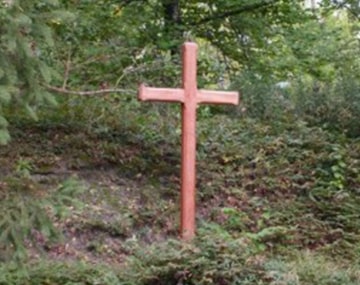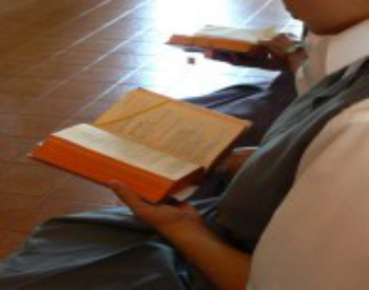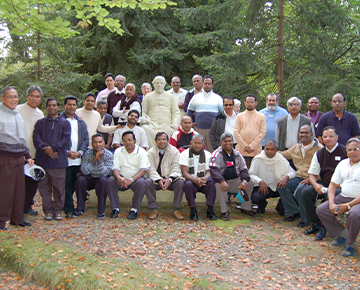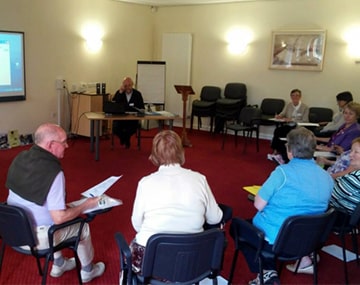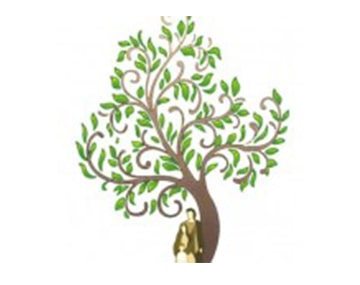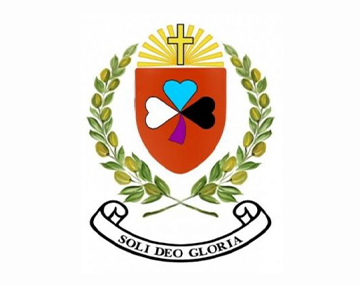The Holy Family Priest Members are Diocesan Priests who live according to the spirituality of the Holy Family in their daily life and parish ministry.
Holy Family priests tell their stories.
Fr. Jean Louis
A long time ago when I was seventeen years old, I was at a camp organised by the Eucharistic Youth Movement. A companion to whom I had spoken about my desire to be a missionary in Africa said to me, “The best way to see things clearly is to personalise your faith”. The result was that instead of becoming a White Father, I became a diocesan priest in Gironde. And I am certain that the good advice I received guided me during my teenage years and young adulthood. The I met a Holy Family Apostolic Sister who told me about the Priest Associates – one of the five Vocations that constitute the Family of Pierre Bienvenu Noailles.
My first memories of the Christian life go back to the days of my childhood and youth – being introduced to prayer in my family, Sunday Mass and the priests encouraging us to become involved in the life of the parish.
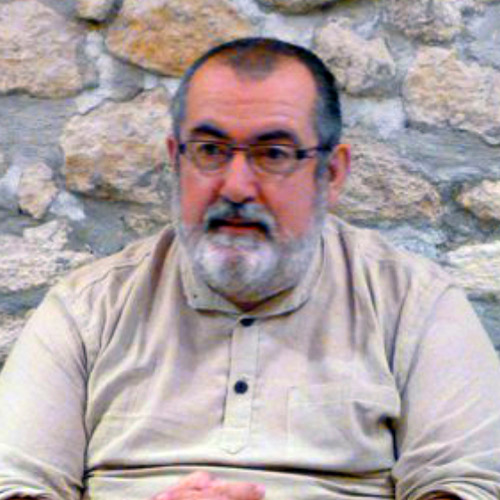
Then during my seminary training I made three big discoveries: The word of God, the teachings of Vatican II and the richness of the spiritual trends down through the centuries. I am grateful that these three focal points moulded me into the priest that I am today and continue to inspire me. I also believe that this way of seeing Church as being composed of a diversity of baptismal Vocations prepared me for saying “Yes” to becoming a Priest Associate. Throughout the assignments that I received from successive bishops I have almost always been able to work with young people, adults, religious sisters and priests. We shared the deep conviction that the Church, in the renewed vision of Vatican II, had to be a people, a family within which each one shared with the others the treasures she/he received from the Holy Spirit for the good of all. I am amazed at how much I have received and have been able to share during my priestly life.
I have always loved reading the bible thanks to a pocket bible that was given to me on the occasion of my profession of faith at the age of twelve. I loved the Gospel sharings that we had with both young people and adults. At the moment, the practice of lectio divina is a great support for my spirituality. I have also discovered the importance of preaching in the ministry of a priest working in a parish. I humbly confess that, until recently, I found the art of homily giving very difficult. Thank God, the Holy Spirit finally took pity on me and gave me a greater charism in that area. During my formation as a Priest Associate I discovered what an essential place the word of God had for our Founder as nourishment for his spiritual life.
Thanks to my grandmother and a visit to Lisieux when I was ten I discovered Carmelite spirituality through St. Thérèse of the Child Jesus. During my seminary training I was able to deepen my understanding of various spiritual families. Before meeting the Holy Family, I was happy to receive nourishment from Carmelite spirituality and from the works of St. Francis de Sales. At the same time, I deepened my understanding of the importance of meeting the Lord with the whole of my personality as a human being in tune with the realism and simplicity of the gospel.
When the Sister who became my accompanier suggested that I read the report of the meeting of the Priest Associates in Kandy (Sri Lanka) in 2004, I realised that I was called to this vocation. In the light of this, I re-read my life as a Christian and as a priest. The Lord had been preparing me for this for a long time by giving me the desire to live my ministry as a diocesan priest in a spiritual family. When I read the life of Pierre Bienvenu, I discovered the place of the word of God, the harmony of the various Vocations and the need to live the evangelical life with a family spirit. I was so happy to find confirmation of what I was trying to live in my daily pastoral life: promoting the desire to make the Church a huge Family gathered together in God like the Holy Family of Jesus, Mary and Joseph.
During my formation I discovered other aspects of Holy Family spirituality – the spirit of God Alone, attentiveness to the signs of the times – something else we got from Vatican II – in order to respond to present-day needs and the international dimension of our Charism which enables me to live in deep and rich communion with the five Vocations. As a diocesan priest, of course, I am linked to my bishop and the priests of my diocese. But I have a very strong fraternal bond with the international group of Priest Associates and I thank God for that. I had the joy of making my commitment in Martillac in October 2007 during the meeting of Priest Associates. Fr. Bernard from Lesotho made his commitment at the same time.
In this year of the Bicentenary of the foundation of our Family, I am happy to share the journey that led me to make this commitment and to be happy living my vocation in the Holy Family of Bordeaux. I would like to thank especially the Apostolic Sisters because it is usually they who awaken the Priest Associate Vocation around the world. Some years ago, a French bishop said quite rightly, “To call is to liberate”. Blessed be the Lord who has called us all to be part of the beautiful Family of the Children of God.
Jean-Louis Despeaux, Holy Family Priest Associate
of the Diocese of Bordeaux
Fr. Rajan
Fr. Rajan spent many years in London as the sole Priest Member of the Holy Family. For this reason, he relied on the Sisters for support in his vocation. It was they, he said, who made him feel at home in the spirit of the Good Father, keeping him updated with new ideas and the emerging trends that would make the apostolate meaningful and relevant.
He writes from Jaffna, Sri Lanka.
It’s three years since I returned to Jaffna. I was appointed to the same parish where I had served before going to London three decades ago. The parishioners themselves were evicted from their traditional homes in 1990 by the security forces as the ethnic conflict intensified and were allowed resettlement twenty-eight years after their eviction and nine years after the end of the war. Resettlement was never going to be easy.
Made Welcome
As I took charge of my new mission, I was given a pleasant surprise by the Priest Associates in the diocese. They came together at short notice to welcome me into their fold. There were fourteen of them. They came with a truckload of plants to begin a tree-planting campaign as part of one of their projects. I was happy to be part of a team once more. Before the pandemic, we used to meet current issues related to our ministry.
At national level, we are about fifty Priest Associates and ‘Live-in Sessions’ are organised once a year. These sessions help deepen our understanding of our charism and spirituality in the light of the vocation we have received and to review our life and mission in order to make it more fruitful and meaningful. The fifty of us come from the two major ethnic groups that have been at war for so long and yet the friendly atmosphere that is created by the familial spirit is one the Holy Family could always be proud of. In our own way, we set the tone for peace and reconciliation and are an example especially among those priests and religious who find it difficult to be open and understanding of each other.
Disappointingly, the attitude of some of the diocesan bishops in the country towards the Association is at best ‘tolerance’. They seem to feel that the diocesan priests’ spirituality is good enough for our sanctity and ministry and that there is no need for another association that, in their judgement, is a distraction.
The matter was discussed at one of our meetings and the host of the day rightly pointed out what Pope John Paul II had to say about this attitude. “Other insights or references to other traditions of spiritual life can contribute to the priest’s journey towards perfection, for these are capable of enriching the lives of individual priests as well as enlivening the priesthood with precious spiritual gifts. Such is the case with many old and new Church associations which welcome priests into their spiritual family”. (Pastores dabi vobis 1992 no. 31).
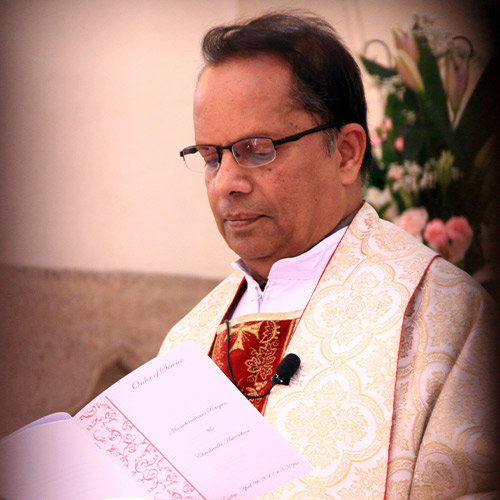
Parish Ministry
As for my Parish ministry, I have had to deal with two major issues. The first is the resettlement of my parishioners and the second is helping my people cope with the lockdowns and their impact on every aspect of their lives
During the long-drawn-out war and multiple displacements, these people had lost access to their productive assets. The painful reality is, that returning to what was their traditional area, they still feel ‘displaced’ because there were no landmarks left to identify their home places. Their houses, Churches, schools, convents, and even cemeteries had been bulldozed and razed to the ground for reasons best known only to the Security Forces.
Headline housing schemes and vocational training centres alone cannot provide solutions to people who have been subjected to brutal violence and displacement. It takes a far more comprehensive approach and a thoughtful strategy to rebuild a war-battered community. It must be one that appreciates the intimate link between the lives of a people and their land and livelihoods and is in keeping with their current realities. But my parishioners have had to and continue to put up with a rather messy resettlement process, counting only on their resilience. With their harrowing experiences over the years of war and multiple displacements, they had lost all sense of belonging to a community. This has continued to be a serious drawback that needs to be addressed as a matter of utmost importance by pastors like me committed to their cause.
The Impact of Covid19
The restrictions imposed to prevent or minimize the risk of Covid-19 have made matters even worse for my already beleaguered community. Without the means to earn an income during lockdowns many are unable to feed themselves and their families. This could further exacerbate undernutrition and micronutrient deficiency for the poorest and most vulnerable in society.
I have six village communities to look after – around 450 families – all of them struggling to get settled and now to survive through the restrictions imposed as a result of the pandemic. The task is heavy and multifaceted.
People have come to depend on their priest to take up their cause with the authorities in matters of housing and resettlement, of their right to life and livelihood security, facilities for the education and well-being of their children. And now, during the pandemic, they depend on us to seek and provide relief assistance from the State, NGOs and well-wishers.
My little parish house has become a haven for people irrespective of caste and creed where they feel their woes are listened to and, where possible, addressed with sincere devotion.
Fr. T.E.T. Rajan

